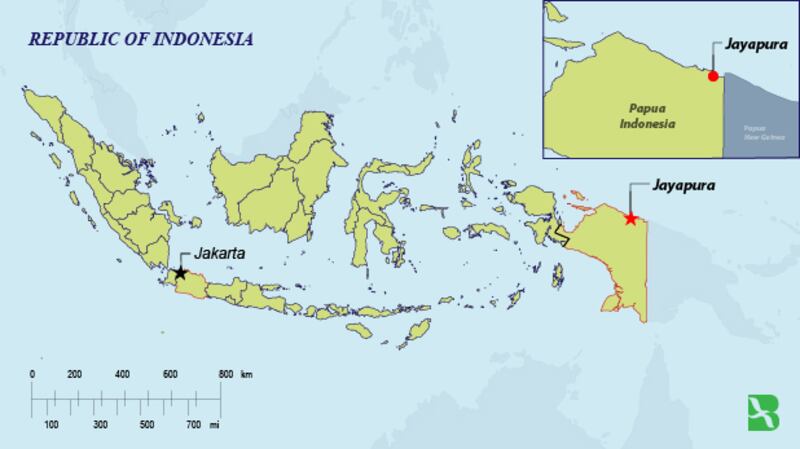Foreigners will face restrictions when entering Papua and West Papua, Indonesia’s security minister said Tuesday, after authorities deported four Australians whom they accused of joining an anti-Jakarta protest during ongoing unrest in the two far-eastern provinces.
In the latest violence, unidentified men armed with spears, arrows and sickles attacked traditional gold miners in Yahukimo regency in Papua province, killing five people, police in Jakarta said Tuesday.
Security affairs minister Wiranto said foreigners would be restricted from entering the Papua region for security reasons, with conditions imposed on those requesting to visit. He did not spell out the conditions.
“What if there’s a riot and [a foreigner] gets killed?” Wiranto told reporters.
“It will only create more problems and there will be an outcry,” he said. “So, it is better to ban [foreigners] and narrow the problem.”
“It could be hard to distinguish between foreigners who come to provoke and well-meaning visitors who come as tourists because they look the same,” he said.
Under current arrangements, foreign journalists have to obtain a special permit to visit Papua for news coverage, despite a pledge by President Joko “Jokowi” Widodo in 2015 to lift all government restrictions on international media in the restive region.
Clashes between security forces and protesters in Papua have killed at least one soldier and four civilians in the past week, according Indonesian authorities.
Papuan activists, however, claimed that at least eight civilians were killed by security forces, including seven in Deiyai regency during clashes between security personnel and protesters last week.
A university student named Mikael died of gunshot wounds and several others were injured on Sunday after police opened fire in an attempt to disperse two groups clashing in the provincial capital Jayapura, deputy mayor Rustan Saru said.
The fighting began after a native Papuan injured a migrant from Sulawesi island using a spear, Rustan told BenarNews.
The unrest, which started on Aug. 19 with arson attacks on government buildings in West Papua, was sparked by perceived harsh and racist treatment of Papuan students by security forces and vigilante groups on Java, the country’s most populous island.
On Aug. 17, heavily armed riot police forced their way into a Papuan student dormitory in Surabaya, Indonesia’s second-largest city, and briefly detained 43 students after accusing them of disrespecting an Indonesian flag by throwing it into a sewer.
Papuan activists said racist taunts including “monkeys” and “pigs” were hurled at them by security personnel.
Australians deported
The Indonesian government sent 2,500 police to Jayapura over the weekend as tensions rose between indigenous Papuans and migrants from other parts of the country after protesters torched government and commercial buildings in the city on Thursday.
Four Australians were deported on Monday for allegedly taking part in an anti-government protest at the mayor’s office in Sorong regency in West Papua on Aug. 27, the immigration department said.
Wiranto said Papua was calm on Tuesday and that “misinformation and incitement have decreased.”
An internet blackout imposed in Papua on Aug. 21 could be lifted on Thursday if the situation continued to be favorable, he said.
The Papua region, which makes up the Indonesian half of New Guinea island, was formally incorporated into Indonesia in 1969 following a U.N.-administered ballot known as the Act of Free Choice.
Many Papuans and rights groups said the vote was a sham because it involved only 1,000 people.
The Free Papua Movement (OPM) launched a fight for an independent state for the region in 1965, three years after Dutch colonizers ceded sovereignty over the territory to Indonesia. OPM has since waged a low-level separatist insurgency against Jakarta’s rule.
The Indonesian military has been accused of gross human rights violations during decades of anti-insurgency campaigns, and rights activists have said that impunity for violators is the norm.
Traditional gold miners attacked
Meanwhile, five people were killed and three others injured when residents armed with crude weapons attacked dozens of traditional gold miners in Yahukimo, national police spokesman Dedi Prasetyo said Tuesday.
“We are still collecting more information because the location is very remote,” Dedi told BenarNews. It was not immediately clear when the attack occurred, authorities said.
A researcher on Papua said that sending more troops to Papua could worsen the situation.
“It could lead to new human rights violations, which would only strengthen resentment against the government,” said Aisah Putri Budiatri, a researcher with the Indonesian Institute of Sciences’ Papua study group.
Usman Hamid, director of Amnesty International Indonesia, warned of attempts to pit ethnic Papuans against migrants.
“This is even more dangerous and should not be allowed to happen,” he told BenarNews.
In Jayapura, indigenous Papuans account for about 45 percent of the population, according to a 2010 government census.
The chant “Free Papua!” has been a common rallying cry at these protests, a sign of general discontent with Jakarta’s rule in the resource-rich far-eastern region, which enjoys a degree of autonomy as part of the central government’s attempts to mollify demands for independence.
The government was open to dialogue with Papuans to improve the situation, but allowing Papua to separate from Indonesia was out of the question, Wiranto said.
“Dialogue is important. It is needed,” he said. “But we won’t entertain demands for independence.”
He said a referendum on self-determination was irrelevant because it had been done before.
“It was a unanimous decision and is supported by many countries, so it cannot be reversed and reviewed again,” he said.

